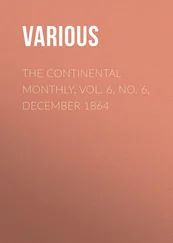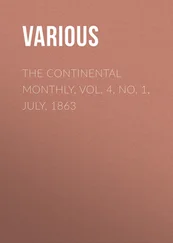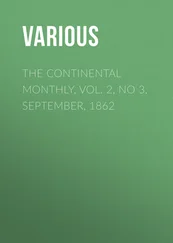Various - The Continental Classics, Volume XVIII., Mystery Tales
Здесь есть возможность читать онлайн «Various - The Continental Classics, Volume XVIII., Mystery Tales» — ознакомительный отрывок электронной книги совершенно бесплатно, а после прочтения отрывка купить полную версию. В некоторых случаях можно слушать аудио, скачать через торрент в формате fb2 и присутствует краткое содержание. Жанр: foreign_detective, Классический детектив, на английском языке. Описание произведения, (предисловие) а так же отзывы посетителей доступны на портале библиотеки ЛибКат.
- Название:The Continental Classics, Volume XVIII., Mystery Tales
- Автор:
- Жанр:
- Год:неизвестен
- ISBN:нет данных
- Рейтинг книги:3 / 5. Голосов: 1
-
Избранное:Добавить в избранное
- Отзывы:
-
Ваша оценка:
- 60
- 1
- 2
- 3
- 4
- 5
The Continental Classics, Volume XVIII., Mystery Tales: краткое содержание, описание и аннотация
Предлагаем к чтению аннотацию, описание, краткое содержание или предисловие (зависит от того, что написал сам автор книги «The Continental Classics, Volume XVIII., Mystery Tales»). Если вы не нашли необходимую информацию о книге — напишите в комментариях, мы постараемся отыскать её.
The Continental Classics, Volume XVIII., Mystery Tales — читать онлайн ознакомительный отрывок
Ниже представлен текст книги, разбитый по страницам. Система сохранения места последней прочитанной страницы, позволяет с удобством читать онлайн бесплатно книгу «The Continental Classics, Volume XVIII., Mystery Tales», без необходимости каждый раз заново искать на чём Вы остановились. Поставьте закладку, и сможете в любой момент перейти на страницу, на которой закончили чтение.
Интервал:
Закладка:
FEODOR MIKHAILOVITCH DOSTOYEVSKY
CRIME AND PUNISHMENT 3 3 (At the risk of shocking the reader, it has been decided that the real permanent detective stories of the world were ill represented without Dostoyevsky's terrible tale of what might be called "self-detection." If to sensitive readers the story seems so real as to be hideous, it is well to recall that Dostoyevsky in 1849 under-went the agony of sentence to death as a revolutionist. Although the sentence was commuted to hard labor in Siberia, and although six years later he was freed and again took up his writing, his mind never rose from beneath the weight of horror and hopelessness that hangs over offenders against the Great White Czar. Dostoyevsky, sentenced as a criminal, herded with criminals, really became a criminal in literary imagination. Add to this a minute observation, a marvelous memory, ardent political convictions—and we can understand why the story here, with others of his, is taken as a scientific text by criminologists.—EDITOR.)
One sultry evening early in July a young man emerged from the small furnished lodging he occupied in a large five-storied house in the Pereoulok S–, and turned slowly, with an air of indecision, toward the K–bridge. He was fortunate enough not to meet his landlady on the stairs. She occupied the floor beneath him, and her kitchen, with its usually open door, was entered from the staircase. Thus, whenever the young man went out, he found himself obliged to pass under the enemy's fire, which always produced a morbid terror, humiliating him and making him knit his brows. He owed her some money and felt afraid of encountering her.
It was not that he had been terrified or crushed by misfortune, but that for some time past he had fallen into a state of nervous depression akin to hypochondria. He had withdrawn from society and shut himself up, till he was ready to shun, not merely his landlady, but every human face. Poverty had once weighed him down, though, of late, he had lost his sensitiveness on that score. He had given up all his daily occupations. In his heart of hearts he laughed scornfully at his landlady and the extremities to which she might proceed. Still, to be waylaid on the stairs, to have to listen to all her jargon, hear her demands, threats, and complaints, and have to make excuses and subterfuges in return—no, he preferred to steal down without attracting notice. On this occasion, however, when he had gained the street, he felt surprised himself at this dread of meeting the woman to whom he was in debt.
"Why should I be alarmed by these trifles when I am contemplating such a desperate deed?" thought he, and he gave a strange smile. "Ah, well, man holds the remedy in his own hands, and lets everything go its own way, simply through cowardice—that is an axiom. I should like to know what people fear most:—whatever is contrary to their usual habits, I imagine. But I am talking too much. I talk and so I do nothing, though I might just as well say, I do nothing and so I talk. I have acquired this habit of chattering during the last month, while I have been lying for days together in a corner, feeding my mind on trifles. Come, why am I taking this walk now? Am I capable of that ? Can that really be serious? Not in the least. These are mere chimeras, idle fancies that flit across my brain!"
The heat in the streets was stifling. The crowd, the sight of lime, bricks, scaffolding, and the peculiar odor so familiar to the nostrils of the inhabitant of St. Petersburg who has no means of escaping to the country for the summer, all contributed to irritate the young man's already excited nerves. The reeking fumes of the dram shops, so numerous in this part of the city, and the tipsy men to be seen at every point, although it was no holiday, completed the repulsive character of the scene. Our hero's refined features betrayed, for a moment, an expression of bitter disgust. We may observe casually that he was not destitute of personal attractions; he was above middle height, with a slender and well-proportioned figure, and he had dark auburn hair and fine dark eyes. In a little while he sank into a deep reverie, or rather into a sort of mental torpor. He walked on without noticing, or trying to notice, his surroundings. Occasionally he muttered a few words to himself; as if, as he himself had just perceived, this had become his habit. At this moment it dawned upon him that his ideas were becoming confused and that he was very feeble; he had eaten nothing worth mentioning for the last two days.
His dress was so miserable that anyone else might have scrupled to go out in such rags during the daytime. This quarter of the city, indeed, was not particular as to dress. In the neighborhood of the Cyennaza or Haymarket, in those streets in the heart of St. Petersburg, occupied by the artisan classes, no vagaries in costume call forth the least surprise. Besides the young man's fierce disdain had reached such a pitch, that, notwithstanding his extreme sensitiveness, he felt no shame at exhibiting his tattered garments in the street. He would have felt differently had he come across anyone he knew, any of the old friends whom he usually avoided. Yet he stopped short on hearing the attention of passers-by directed to him by the thick voice of a tipsy man shouting: "Eh, look at the German hatter!" The exclamation came from an individual who, for some unknown reason, was being jolted away in a great wagon. The young man snatched off his hat and began to examine it. It was a high-crowned hat that had been originally bought at Zimmermann's, but had become worn and rusty, was covered with dents and stains, slit and short of a brim, a frightful object in short. Yet its owner, far from feeling his vanity wounded, was suffering rather from anxiety than humiliation.
"I suspected this," muttered he, uneasily, "I foresaw it. That's the worst of it! Some wretched trifle like this might spoil it all. Yes, this hat is certainly too remarkable; it looks so ridiculous. I must get a cap to suit my rags; any old thing would be better than this horror. Hats like these are not worn; this one would be noticeable a verst 4 4 1,000 yards.
off; it would be remembered; people would think of it again some time after, and it might furnish a clew. I must attract as little attention as possible just now. Trifles become important, everything hinges on them."
He had not far to go; he knew the exact distance between his lodging and present destination—just seven hundred and thirty paces. He had counted them when his plan only floated through his brain like a vague dream. At that time, he himself would not have believed it capable of realization; he merely dallied in fancy with a chimera which was both terrible and seductive. But a month had elapsed, and he had already begun to view it in a different light. Although he reproached himself throughout his soliloquies with irresolution and a want of energy, he had accustomed himself, little by little, and, indeed, in spite of himself, to consider the realization of his dream a possibility, though he doubted his own resolution. He was but just now rehearsing his enterprise, and his agitation was increasing at every step.
His heart sank, and his limbs trembled nervously, as he came to an immense pile of building facing the canal on one side and the street on the other. This block was divided into a host of small tenements, tenanted by all sorts of trades. People were swarming in and out through the two doors. There were three or four dvorniks 5 5 Janitors.
belonging to the house, but the young man, to his great satisfaction, came across none of them, and, escaping notice as he entered, mounted at once the stairs on the right hand. He had already made acquaintance with this dark and narrow staircase, and its obscurity was grateful to him; it was gloomy enough to hide him from prying eyes. "If I feel so timid now, what will it be when I come to put my plan into execution?" thought he, as he reached the fourth floor. Here he found the passage blocked; some military porters were removing the furniture from a tenement recently occupied, as the young man knew, by a German official and his family. "Thanks to the departure of this German, for some time to come there will be no one on this landing but the old woman. It is as well to know this, at any rate," thought he to himself, as he rang the old woman's bell. It gave a faint sound, as if it were made of tin instead of copper. In houses of this sort, the smaller lodgings generally have such bells.
Интервал:
Закладка:
Похожие книги на «The Continental Classics, Volume XVIII., Mystery Tales»
Представляем Вашему вниманию похожие книги на «The Continental Classics, Volume XVIII., Mystery Tales» списком для выбора. Мы отобрали схожую по названию и смыслу литературу в надежде предоставить читателям больше вариантов отыскать новые, интересные, ещё непрочитанные произведения.
Обсуждение, отзывы о книге «The Continental Classics, Volume XVIII., Mystery Tales» и просто собственные мнения читателей. Оставьте ваши комментарии, напишите, что Вы думаете о произведении, его смысле или главных героях. Укажите что конкретно понравилось, а что нет, и почему Вы так считаете.












